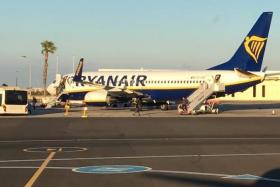A report published by Ryanair has revealed a 67 per cent pay gap between male and female employees.
Ryanair has 554 UK pilots, 586 UK cabin crew and 42 non crew members of staff. Some 1.4 per cent (eight) of its pilots are women, as are 69 per cent of the airline’s cabin crew.
 The airline is based in Ireland, and as such its management
and administration teams are not taken into account in the report, which
focuses solely on UK employees excluding Northern Ireland.
The airline is based in Ireland, and as such its management
and administration teams are not taken into account in the report, which
focuses solely on UK employees excluding Northern Ireland.The report reveals that the median hourly pay gap is 71.8 per cent in favour of men.
“Because the majority of our UK pilots are male, on average, the hourly pay rate for male employees is 67 per cent higher than that for female employees,” says Ryanair in its report.
“The median hourly pay rate equivalent for male employees is 71.8 per cent higher than that for female employees.”
There was a 3.4 per cent median bonus pay gap between men and women, which was explained as a result of most pilots being male.
In a statement provided to The Independent, a Ryanair spokesman said: “Ryanair is an equal pay employer and we are proud of the thousands of professional men and women who work hard to deliver great service and Europe’s lowest fares to our customers. Like all airlines, our gender pay in the UK is materially affected by the relatively low numbers of female pilots in the aviation industry.
Tomorrow is the deadline for companies with over 250 employees to report gender pay gaps within their business.
The Equality Act 2010 (Gender Pay Gap Information) Regulations 2017 made it mandatory for companies with more than 250 employees to report on gender pay gaps.
According to the ACAS website, employers have the opportunity to “provide a narrative” with their calculations, such as Ryanair’s explanation of its male/female pilot ratio, which can explain the reasons behind a gender pay gap and “give details about actions” the company is taking to reduce it.
EasyJet submitted its report in November 2017, arguing that its overall pay gap was due to gender imbalance among pilots rather than unequal pay.
“Like all airlines, pilots make up a large proportion of easyJet’s employees, receive high salaries and most materially, 94 per cent are male,” the airline said at the time.
The airline has a target for 20 per cent of its pilots to be women by 2020; it recruited 49 female new entrant co-pilots in 2017, a 48 per cent increase on the previous year.